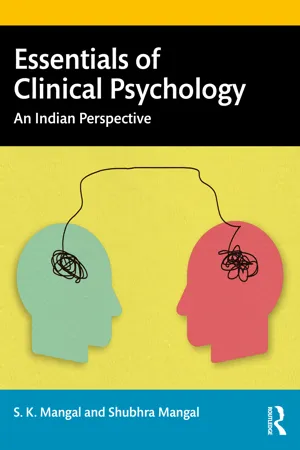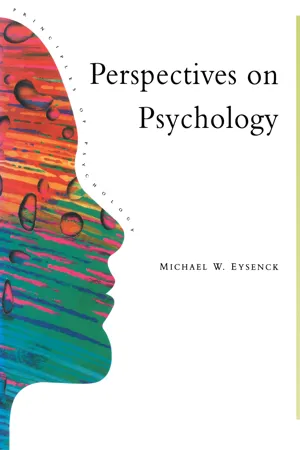Psychology
Scientific Research
Scientific research in psychology involves the systematic investigation of human behavior and mental processes using empirical methods. It aims to expand knowledge and understanding of psychological phenomena through the formulation of hypotheses, collection and analysis of data, and drawing of conclusions. This rigorous approach helps to ensure the reliability and validity of findings in the field of psychology.
Written by Perlego with AI-assistance
Related key terms
1 of 5
9 Key excerpts on "Scientific Research"
- eBook - ePub
Essentials of Clinical Psychology
An Indian Perspective
- S. K. Mangal, Shubhra Mangal(Authors)
- 2023(Publication Date)
- Routledge(Publisher)
- Research is not conducted in a haphazard way. It represents systematized efforts, studious inquiry or examination, and scientific or critical investigation involving well-planned and definite steps of a scientific method or approach for realizing its set goals or objectives.
- Research is a process and not a product. It can be employed as a tool, means, or method of manipulating the things, concepts, and available data for arriving at reliable and valid conclusions for serving the goals or objectives of the research.
After getting, acquainted with what research is, it becomes essential for us to examine some of the pertinent questions regarding the conduct of research work in clinical psychology in the form of:- What are the purposes or goals of research studies in clinical psychology?
- What types or kinds of research are undertaken in clinical psychology?
- What methods and techniques are used in collecting information or data in clinical psychology research?
- What is Meta-Analysis as a method used by researchers in clinical psychology for the reliability and validity of research findings?
- What type of ethical principles or codes of conduct need to be observed on the part of researchers in clinical psychology?
Goals of Clinical Psychology Research or Investigation
As said earlier in defining the term, research is a purposeful activity undertaken for serving concrete objectives and goals. Now the question arises, what purposes or goals are aimed for, in general, on the part of clinical psychologist researchers? The research work carried out in this concern must help clinical psychologists in their professional preparation and effective exercising of their functions as professional clinical psychologists, such as knowing and understanding the various types of psychological disorders, their prevalence, characteristic symptoms and syndromes, causes of their occurrence, methods of their assessment and diagnosis, and the ways and approaches utilized for their treatment. In light of these different functions associated with research work in clinical psychology, the goals and objectives served through clinical psychology research may be summed up as follows. - eBook - PDF
The Practical Researcher
A Student Guide to Conducting Psychological Research
- Dana S. Dunn(Author)
- 2012(Publication Date)
- Wiley-Blackwell(Publisher)
The Research Loop of Experimentation Most science that is conducted by using the scientific method follows what we can call the research loop of experimentation, which is in part based on Platt’s (1964) views of scientific inference. As shown in Figure 1.2, a series of discrete steps are followed in a specified order before looping back to the first one. Let’s go through the figure step by step. In step 1, a researcher makes observations or collects facts and then puts them together to form a theory. Alternatively, the researcher may decide to pursue an existing 9 Chapter 1: The Why and How of Psychological Research Step 1: Collect observations or rely on existing theory Step 2: Develop a testable hypothesis Step 3: Conduct an experiment to test the hypothesis and to eliminate the competing hypothesis(es) Step 4: Interpret the results of the experiment(s) Step 5: Begin the loop again. Go back to step 1 FIGURE 1.2 The research loop of experimentation theory but take it in some new, heretofore untested direction (recall our discussion of inductive and deductive reasoning). Step 2 involves the creation of a research hypothesis. A hypothesis is a statement or expectation based on the theory devised in step 1. It explicitly concerns the outcome of a proposed experiment based on the identification of variables and how they affect one another. A variable is anything that can be measured or can take on a different value, such as height, weight, a rating on a scale, the air temperature on a summer day, an IQ score, and so on. Hypotheses are largely educated guesses or predictions based on observations or a theory about how one thinks the world might work with respect to a particular set of variables. Psychology is largely an empirically based science because it is focused on identi- fying which personal or situational variables cause a given behavior to occur. Psycholo- gists usually want to examine some hypothesized connection between two or more variables. - eBook - PDF
- Douglas Bernstein, , , (Authors)
- 2015(Publication Date)
- Cengage Learning EMEA(Publisher)
Tests of hypotheses are based on objective, quan-tifiable evidence, or data, representing the variables of interest. If data are to be useful, they must be evaluated for reliability and validity . Explanations of phenomena often take the form of a theory , which is a set of statements that can be used to account for, predict, and even suggest ways of controlling certain phenomena. Theories must be subjected to careful evaluation. Research Methods in Psychology How do psychologists learn about people? Research in psychology, as in other sciences, focuses on four main goals: description, prediction, control, and explanation. Observational methods such as naturalistic observation entail watching without interfering as behavior occurs in the natural environment. These methods can be revealing, but care must be taken to ensure that observers are unbiased and do not alter the behavior being observed. Case studies are intensive examinations of a particular individual, group, or situation. They are useful for studying new or rare phenomena and for evaluating new treatments or training programs. Surveys ask questions, through interviews or questionnaires, about behavior, attitudes, beliefs, opinions, and intentions. They provide an efficient way to gather large amounts of data from many people at a relatively low cost, but their results can be distorted if questions are poorly phrased, if answers are not given honestly, or if respondents do not constitute a representative sample of the population whose views are of interest. Correlational studies examine relationships between variables in order to describe research data, test predictions, evaluate theo-ries, and suggest hypotheses. Correlational studies are an impor-tant part of psychological research. However, the reasons behind the relationships they reveal cannot be established by correlational studies alone. Summary 47 Copyright 2016 Cengage Learning. All Rights Reserved. - eBook - PDF
Research in Psychology
Methods and Design
- Kerri A. Goodwin, C. James Goodwin(Authors)
- 2016(Publication Date)
- Wiley(Publisher)
Research can be classified in terms of its goals, setting, and type of data collected. We will make the distinctions between the following varieties of research: (a) basic or applied research, (b) laboratory or field research, and (c) quantitative or qualitative research. The Goals: Basic versus Applied Research Some research in psychology emphasizes describing, predicting, and explaining the fundamental principles of behavior and mental processes and such research goals define basic research. Traditionally, those involved in basic research in psychology have studied such topics as percep- tion, learning, cognition, and basic neurological and physiological processes as they relate to psychological phenomena. In contrast, applied research is so named because it has direct and immediate relevance to the solution of real‐world problems. To illustrate the distinction, consider some research in the area of attention (a topic with a long history—recall the 1913 Dallenbach study in Box 1.1 in Chapter 1). A basic research study might investigate the ability of people to simultaneously complete two different information‐processing tasks in a laboratory. The researcher might examine the effects of the similarity of the tasks, their difficulty, and so on. One well‐established method involves “shadowing” in a “dichotic listening” task, a technique pio- neered by Cherry (1953) and Broadbent (1958) in England. A research participant in this type of experiment wears earphones, with a different message coming into each ear simultaneously. The task is to focus attention on one message and shadow it—that is, while the message in one ear (the “attended” ear) is being heard, the subject tries to repeat out loud the message verbatim, as it is being heard. Of interest is what happens to the message coming into the other (i.e., the “unat- tended”) ear. - eBook - PDF
A Critical History and Philosophy of Psychology
Diversity of Context, Thought, and Practice
- Richard T. G. Walsh, Thomas Teo, Angelina Baydala(Authors)
- 2014(Publication Date)
- Cambridge University Press(Publisher)
11 Constructing psychological research Chapter outline Introduction 502 Part 1 The language of research 504 Psychologists ’ scienti fi c language 504 Conclusion 507 Part 2 Investigative practice with humans 508 Research relationships 508 Box 11.1 Current investigate practices 511 Ethical relationships with humans 512 Conclusion 516 Part 3 Investigative practice with animals 517 Orientations towards animal psychology 517 Ethical relationships with animals 522 Conclusion 523 Part 4 Methods for gathering data 524 Non-experimental methods 524 Experimentation 525 Box 11.2 Group vs. case studies 528 The social psychology of psychological research 529 Qualitative methods 533 Conclusion 535 Part 5 Measurement and quantitative analysis 536 History of quanti fi cation and measurement 537 History of statistics 539 Issues in psychological statistics 541 Qualitative methodology 544 Conclusion 545 Part 6 Research report-writing 546 Scienti fi c rhetoric and report-writing 546 APA style 548 Conclusion 550 Part 7 Thematic review 550 Science, pseudoscience, or interpretive science 551 Intersubjectivity 552 Summary 552 Introduction .................................................................................. After the Scientific Revolution natural science came to overshadow religious knowledge about nature and human nature. Many natural philosophers became disenchanted with divine and mysterious explanations. They regarded nature as mechanistic, manipulable for human ends, even conquerable. Emergent empirical methods and quantification techniques enhanced scientists ’ confidence about their work. Societally, economically privileged Western nations became increasingly rationalized and bureaucratic. Efficient administration of industry, commerce, and government depended on applications of systematic knowledge; consequently, social management of individuals escalated. In addition, cultivating individual experience became culturally desirable. - eBook - ePub
- Michael W. Eysenck(Author)
- 2013(Publication Date)
- Psychology Press(Publisher)
The most common way in which scientists (including psychologists) attempt to test their hypotheses is by means of experiments. Although this is frequently the most effective method available, the history of science demonstrates very clearly that scientific progress does not necessarily depend on carrying out laboratory experiments. Consider, for example, the science of astronomy. In spite of the fact that astronomers generally don't carry out experiments in the normal sense, they have been able through careful observation to obtain much valuable information about the nature of the universe.In similar fashion, many important issues in psychology cannot be examined under laboratory conditions. For example, those who have been exposed to traumatic events (events causing a powerful shock) such as a major accident or kidnapping, sometimes subsequently develop a condition known as post-traumatic stress disorder. It is very important for psychologists to try to understand the processes triggering this disorder, but it would be completely unacceptable in ethical terms to attempt to produce this disorder under experimentally controlled conditions.Goals of science
What are the goals of science? As Malim et al, (1992) pointed out, three of the main goals are as follows:- prediction;
- understanding ;
- control.
The theories formed by scientists permit them to make predictions or hypotheses about what will happen in situations that they have not previously investigated. For example, psychologists such as Thorndike discovered that animals could be persuaded to behave in certain ways if their behaviour was followed by reward or reinforcement. This led them to predict that the same would be true of the human species. The success or otherwise of predictions stemming from a theory are of great importance: any theory that generates numerous incorrect predictions must be seriously flawed.Even if a theory generates a large number of accurate predictions, it does not necessarily follow that we will have a good understanding of what is happening. For example, a theory of memory proposed by Craik and Lockhart (1972) included the prediction that memory will be better for material that has been processed in terms of its meaning than for material that has not. Although this prediction has been confirmed experimentally several times, the precise reasons why it is beneficial to process meaning still remain unclear. - eBook - PDF
- John Hunsley, Catherine M. Lee(Authors)
- 2017(Publication Date)
- Wiley(Publisher)
3. Research Project Please provide title, anticipated starting and completion dates, and funding source. Please provide a summary (i.e., no CONTINUED . . . Research Designs 83 Research Designs As we describe in the following sections, numerous research designs are used in clinical psy- chology research. These designs vary in the degree of experimental manipulation (from natu- ralistic observation of behaviour to true experimental designs) and in the number of participants involved (from single participant designs to epidemiological designs using tens of thousands of participants). Although it is tempting to view certain designs as better or stronger than others, this is an oversimplification of research in a given domain. All designs have advantages and disadvantages. As we describe below, some designs are better than others in their capacity to control certain threats to research validity. We cannot determine the value of a design without knowing the state of knowledge in a research domain. For example, once a research area is well developed, correlational designs are unlikely to add anything new to the scientific literature. On the other hand, in a relatively new research area, even a relatively simple case study may make a meaningful contribution to the literature. No single study can answer all of the important questions in a research area. Often a good study generates far more questions than answers. Research must be seen as cumulative, with each study contributing to the knowledge base of an area. Clinical psychology, as broadly defined in Chapter 1, involves the application of scientific knowledge to the understanding, assessment, prevention, and treatment of psychological disorders and distress. Many different research areas are relevant to the practice of clinical psychology. It is obvious that clinical prac- tice should be informed by research on assessment, prevention, and intervention. - eBook - PDF
- Duane Schultz(Author)
- 2013(Publication Date)
- Academic Press(Publisher)
1 The Study of the History of Psychology Introduction The antecedents of modern psychology can be traced to the earliest of inquiring minds. Man seems always to have been fascinated by his own behavior, and ruminations on human nature and conduct fill many philosophical and theological volumes. Broadly speaking, the same kinds of questions now asked about the nature of man were asked centuries ago. The important difference between modern psychology and its intel-lectual precursors is not so much the kinds of questions asked as the methods used to seek the answers. Until the last quarter of the nineteenth century, man attempted to study himself by speculation, intuition, and generalization from his own experiences. The major change or breakthrough occurred when man tried to answer his questions about human nature by using the tools and methods of science, which had already been demonstrated successful in answering questions in the natural sciences. When man tried to use carefully controlled observation and experimentation to study human nature, then and only then did psychology begin to attain some indepen-dence from its philosophical antecedents. In order to break away from philosophy, psychology had to develop a more precise and objective way of dealing with its problems than 2 THE STUDY OF THE HISTORY OF PSYCHOLOGY its forebears had used. Much of the history of psychology after its break with philosophy involves, as we shall see, the continuing refinement of its tools, techniques, and methods of study in order to achieve increased precision and objectivity in both its answers and questions. The first sign of a distinct field of inquiry known as psychology, then, was the adoption, in the last quarter of the nineteenth century, of the scientific method as the means for attempting to solve its problems. During that period there were several formal indications that psychology was beginning to flourish. - eBook - PDF
- Rose M. Spielman, William J. Jenkins, Marilyn D. Lovett(Authors)
- 2020(Publication Date)
- Openstax(Publisher)
Researchers can test cause-and-effect hypotheses by conducting experiments. Ideally, experimental participants are randomly selected from the population of interest. Then, the participants are randomly assigned to their respective groups. Sometimes, the researcher and the participants are blind to group membership to prevent their expectations from influencing the results. In ideal experimental design, the only difference between the experimental and control groups is whether participants are exposed to the experimental manipulation. Each group goes through all phases of the experiment, but each group will experience a different level of the independent variable: the experimental group is exposed to the experimental manipulation, and the control group is not exposed to the experimental manipulation. The researcher then measures the changes that are produced in the dependent variable in each group. Once data is collected from both groups, it is analyzed statistically to determine if there are meaningful differences between the groups. Psychologists report their research findings in peer-reviewed journal articles. Research published in this format is checked by several other psychologists who serve as a filter separating ideas that are supported by evidence from ideas that are not. Replication has an important role in ensuring the legitimacy of published research. In the long run, only those findings that are capable of being replicated consistently will achieve consensus in the scientific community. 2.4 Ethics Ethics in research is an evolving field, and some practices that were accepted or tolerated in the past would be considered unethical today. Researchers are expected to adhere to basic ethical guidelines when conducting experiments that involve human participants. Any experiment involving human participants must be approved by an IRB. Participation in experiments is voluntary and requires informed consent of the participants.
Index pages curate the most relevant extracts from our library of academic textbooks. They’ve been created using an in-house natural language model (NLM), each adding context and meaning to key research topics.








